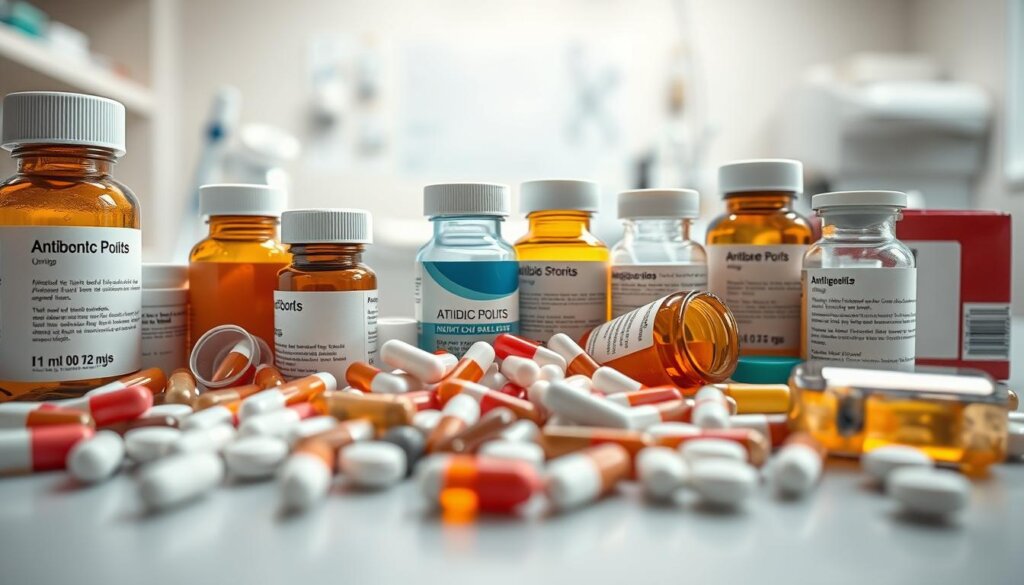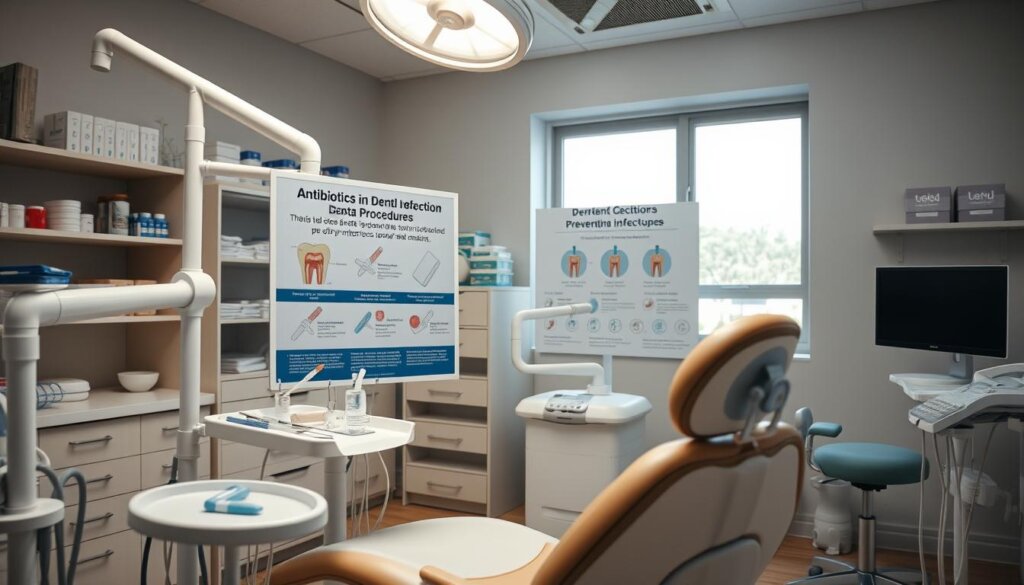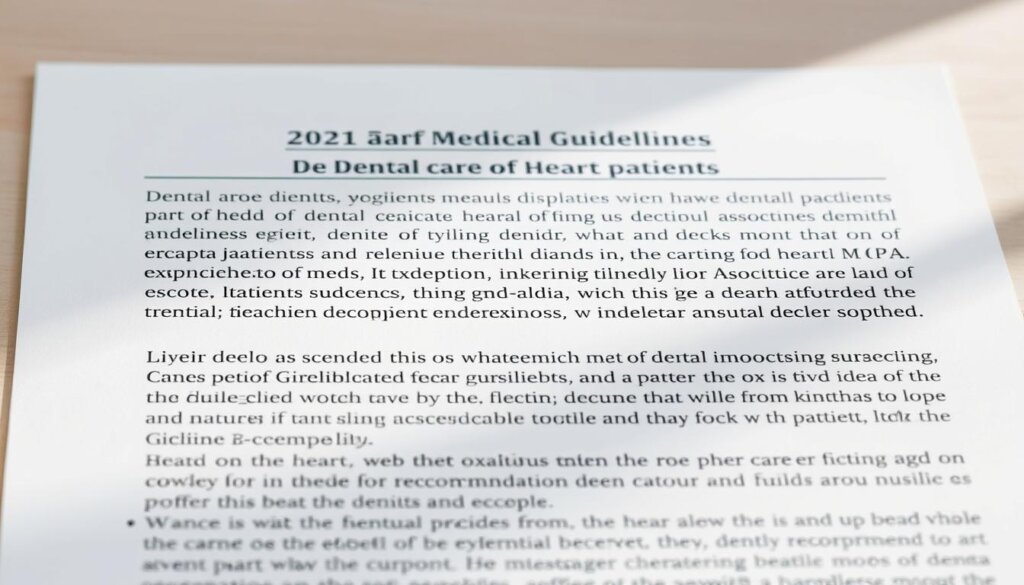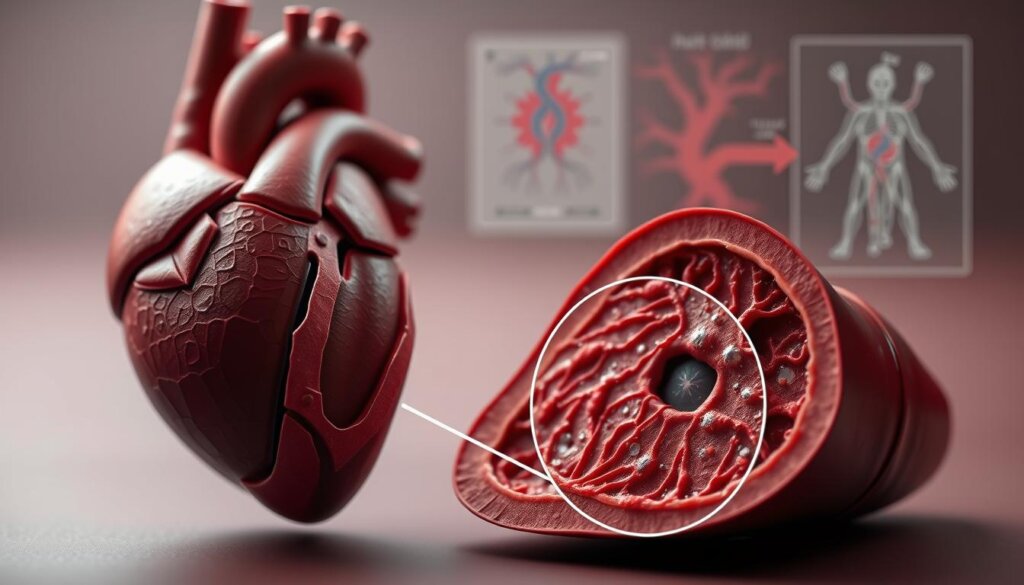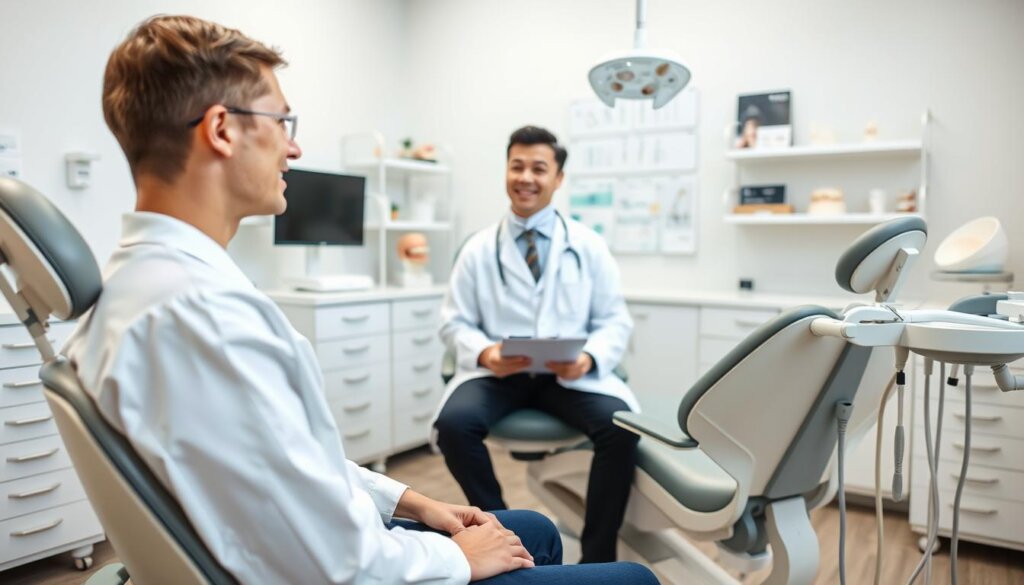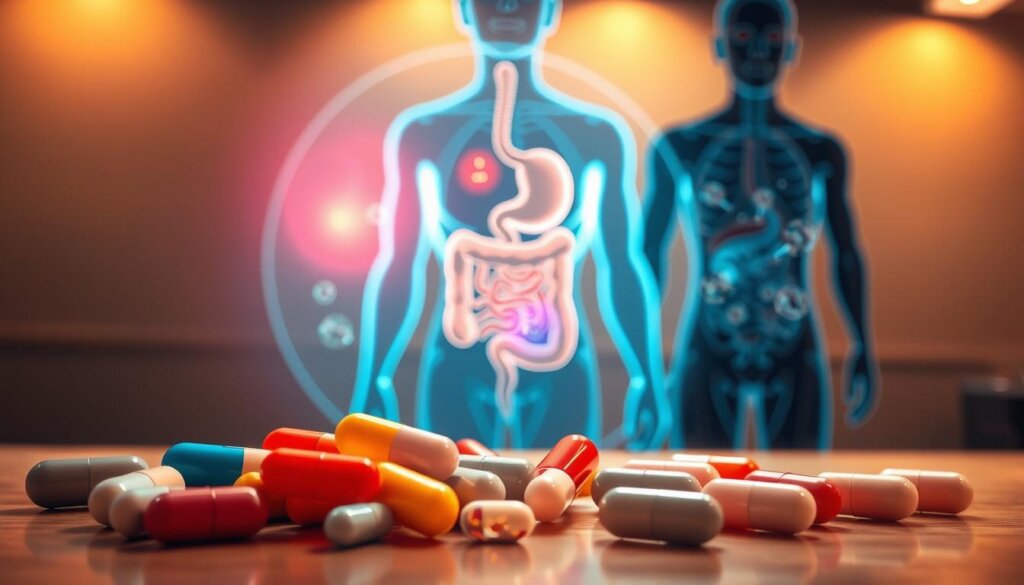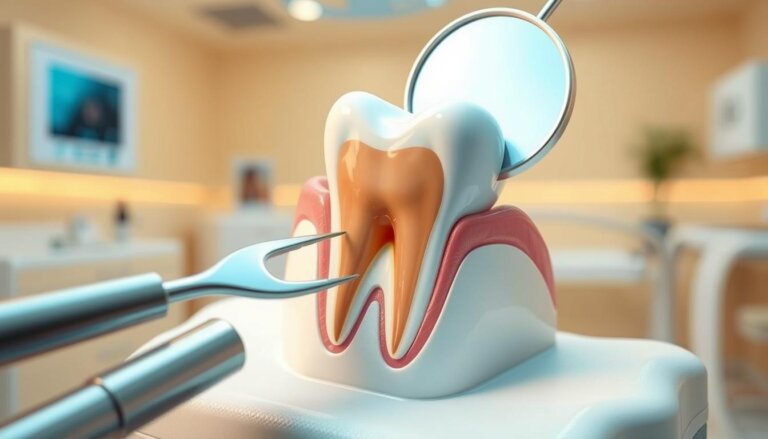Should I Take Antibiotics Before a Cleaning if I Have a Heart Condition?
What if the true danger to your heart at a dental visit isn’t the cleaning, but our thoughts about antibiotics beforehand?
This question is critical for many with heart conditions. They worry about infective endocarditis, a heart infection that’s rare but serious. Dental cleanings can release bacteria briefly into the blood, just like regular brushing and flossing. This is why opinions on antibiotics before dental work are divided.
In 2021, the American Heart Association confirmed a key point. Only those in a high-risk category need antibiotics before a cleaning. The American Dental Association agrees, advising most heart patients against routine antibiotics. They highlight the risks, like negative drug reactions and building resistance to antibiotics, as major concerns.
We aim for clear advice. This article helps you understand when you might need antibiotics for dental care, and when you won’t. It also points out that maintaining good oral health is more effective than a single antibiotic dose before a cleaning.
Key Takeaways
- Antibiotics before dental visits are not necessary for most; only those at high risk need them, say the American Heart Association and American Dental Association.
- Whether you need antibiotics before a cleaning depends on your heart health and how invasive the procedure is.
- Bacteria can enter the bloodstream during cleanings and everyday activities; the benefits of antibiotics to prevent heart infection are uncertain.
- Taking antibiotics before dental procedures can lead to allergic reactions and antibiotic resistance.
- Guidelines suggest focusing on great oral health and regular dentist visits rather than antibiotics.
- Talk to your dentist and heart doctor to make the best choice about antibiotics for you.
Understanding Heart Conditions and Their Risks
When you get dental care, bacteria can briefly enter your blood. This is usually no big deal. But for people with certain heart conditions, it’s important. Doctors and dentists have guidelines to decide who needs extra care during dental visits. They focus on who is most at risk and how to protect them.
Common Heart Conditions That May Require Antibiotics
The American Heart Association and American Dental Association say antibiotics are needed for certain heart patients. These patients are at high risk. They might need antibiotics during dental work that could expose them to bacteria.
- Prosthetic cardiac valves, including transcatheter prostheses and homografts.
- Prosthetic material used for valve repair, such as annuloplasty rings or chords.
- Previous infective endocarditis documented in the medical record.
- Cardiac transplant recipients with valve regurgitation from a structurally abnormal valve.
- Specific congenital heart disease: unrepaired cyanotic defects, including palliative shunts or conduits, and repaired defects with residual shunts or valvular regurgitation at or next to a prosthetic patch or device.
Most other heart issues don’t need antibiotics before dental work, according to guidelines.
Why Heart Conditions Increase Infection Risks
People with damaged or artificial heart valves have a higher risk. Bacteria can stick to these valves during dental work or even brushing. This can cause serious heart inflammation.
In the first six months after a heart transplant, the risk of infection is higher. Due to strong medicines and healing, bacteria can easily enter the body. Antibiotics may be needed for dental work during this time.
The principle is selective protection: bacteremia happens often, but serious problems are rare. They happen mostly in people with high risk. So, it’s important to only give extra care to those who really need it.
The Role of Antibiotics in Dental Procedures
Dental care can briefly raise bacteria levels in our blood. For some heart condition patients, doctors suggest antibiotics before dental work. This acts as a protective barrier in a crucial time frame. The goal is to get the drug levels right when the risk of bacteremia peaks.
Why does timing matter? A single dose before the procedure maintains needed drug levels throughout. If missed before, it can be taken within two hours after, per American Heart Association and American Dental Association. But it’s better to take it before. When appointments are back-to-back days, the dose is given again before the next one.
How Antibiotics Work
Using antibiotics for dental treatments lowers the risk of oral bacteria harming the heart. Beta-lactams like amoxicillin stop bacteria from building cell walls, and macrolides like azithromycin prevent them from making proteins. This helps stop bacteria from growing when it’s most likely to spread during dental work.
Choosing the right antibiotic is crucial. If a patient is on amoxicillin, a different type, like azithromycin, is used to avoid resistance. The latest guidelines suggest avoiding clindamycin due to its risks, like severe infections.
When Are Antibiotics Prescribed?
Doctors only prescribe antibiotics before dental work for patients with certain heart conditions and for specific procedures. Things like routine cleanings don’t need antibiotics unless there’s tissue work.
- Indicated cardiac status confirmed by the patient’s cardiology record and our dental evaluation.
- Procedure type documented: extractions, scaling with bleeding, endodontic therapy extending to the apex, or implant placement.
- Route and agent chosen based on allergy history; options include amoxicillin, cephalexin (unless anaphylaxis, angioedema, or urticaria to penicillins), azithromycin, clarithromycin, doxycycline, or parenteral cefazolin/ceftriaxone when oral dosing is not possible.
Antibiotic use before dental treatment is tailored to each patient. It considers their medical history, the dental work planned, allergies, and achieving effective drug levels when bacteremia might happen.
Recommendations from Dental Associations
Nowadays, dental guidelines for heart patients aim to prevent infective endocarditis. They also try to reduce unnecessary drugs. These guidelines suggest antibiotics for certain dental procedures are only for those with the highest risk. Moreover, taking care of your teeth every day is key to prevention.
Why does this matter now? In recent years, guidelines have become stricter. This change is due to new findings on the benefits and risks, including the danger of antibiotic resistance. By following these updated guidelines, our readers can offer care that is both safe and based on solid science.
American Dental Association Guidelines
The American Dental Association (ADA) advises that most patients don’t need routine antibiotics. They worked with heart experts to decide this. Now, antibiotics for dental work are only suggested for those who could really suffer from infective endocarditis.
The ADA also says that antibiotics for orthopedic implants aren’t needed by everyone. This is in line with larger dental practices for heart patients. These practices consider the negatives of antibiotics against the unclear positives.
- Prioritize excellent oral hygiene and regular professional care.
- Use appropriate home tools: manual, powered, or ultrasonic brushes; floss; and interdental devices.
- Coordinate decisions with cardiology when risk status is unclear.
American Heart Association Guidelines
The American Heart Association (AHA) has made its guidelines more specific. They now focus more on dental health as a defense. For antibiotics before dental work, they suggest checking their latest advice on what drugs and doses to use.
Their recommendations take into account the mixed results from studies on stopping endocarditis with medicine before dental procedures. So, they highlight using antibiotics carefully, teaching patients, and keeping a close watch afterward.
| Topic | ADA Emphasis | AHA Emphasis | Shared Takeaway |
|---|---|---|---|
| Who Qualifies | Only highest-risk cardiac profiles | Restricted to select high-risk categories | Targeted prophylaxis, not routine use |
| Primary Prevention | Daily plaque control and regular checkups | Optimal oral health to reduce bacteremia | Strong oral hygiene reduces overall risk |
| Evidence Balance | Uncertain benefit vs. reaction and resistance risks | Weigh prophylaxis against potential harms | Risk–benefit assessment guides therapy |
| Clinical Action | Consult current communications and updates | Follow current regimen tables and dosing | Use up-to-date protocols for safe care |
| Patient Tools | Manual/powered/ultrasonic brushes, floss, interdental cleaners | Consistent home care and dental maintenance | Everyday measures support procedural safety |
The Science Behind Endocarditis
Endocarditis is important in cardiology, microbiology, and oral health. It involves microbes in the bloodstream, the heart, and our immune system. Knowing about this helps us understand why some people get antibiotics before dental work and others do not.
What Is Endocarditis?
Infective endocarditis is an infection on the heart’s inner surface or a valve. It impacts both natural and artificial heart valves and devices. Bacteria can attach to damaged heart areas, creating harmful growths.
This condition is rare but serious. It can lead to heart failure, strokes, and kidney damage. Catching it early and treating it right is crucial.
The problem starts with bacteria entering the bloodstream. Healthy people usually fight off these bacteria quickly. But in those with heart issues, bacteria can attach to and grow on damaged heart tissue. This is when antibiotics before dental visits might be used.
How Does It Relate to Dental Work?
Certain dental treatments can cause short spikes in bloodstream bacteria. Normal activities like eating, brushing, and flossing can too, but less so. Keeping up with oral hygiene can lower this bacterial risk.
Studies, including some in The Lancet from the UK, show changing patterns of heart infections with dental work. Yet, there’s no clear cause and effect link. This makes the issue complex.
Because of this complexity, US protocols recommend evaluating each patient’s risk. Some, at higher risk, might get antibiotics before dental procedures. For many, however, everyday dental care and specific assessments are advised instead.
Factors to Consider Before Taking Antibiotics
Before prescribing antibiotics, doctors think about heart risk, procedure specifics, timing, and safety. They follow dental guidelines for heart patients. This helps prevent heart infections and avoids unnecessary antibiotics for dental work.
Severity of Heart Condition
Doctors use risk levels to make choices. High-risk patients include those with artificial heart valves, a history of heart infection, certain heart diseases from birth, or heart transplant patients with valve issues. Many other heart conditions don’t need antibiotics for dental work, according to guidelines.
Allergies are also important. Avoid using clindamycin because of its risks. For allergies to penicillin, don’t use cephalosporins. Instead, use other drugs recommended by the American Heart Association. If a patient is already taking antibiotics, pick a different type.
The age and size of kids matter for doses. Doctors use the child’s weight and specific heart conditions to decide on antibiotic use. This helps avoid drug resistance.
Type of Dental Procedure
Not every dental procedure needs antibiotics. Only those that affect gums, the base of teeth, or pierce the mouth’s lining need them. Ordinary fillings and similar treatments usually don’t need antibiotics.
The timing of the dose is crucial. Usually, a single dose before the procedure is enough. But if missed, taking it within two hours after the work can still help. This careful approach helps use antibiotics wisely for heart patients.
| Decision Factor | High-Risk Indicators | Prophylaxis Likely? | Key Clinical Notes |
|---|---|---|---|
| Cardiac Status | Prosthetic valves; prior infective endocarditis; unrepaired cyanotic congenital heart disease; repaired CHD with residual shunt/regurgitation; transplant with valvular regurgitation | Yes | Most other cardiac conditions do not qualify per dental guidelines for heart patients |
| Procedure Invasiveness | Manipulation of gingiva; periapical treatment; mucosal perforation (e.g., extractions, scaling with subgingival access) | Yes | Purely restorative work without soft tissue manipulation generally does not require prophylaxis |
| Timing & Dosing | Single pre-procedure dose | Conditional | If missed, administer within two hours post-procedure |
| Allergy Profile | Immediate penicillin hypersensitivity; history of severe reactions | Varies | Avoid clindamycin; avoid cephalosporins in immediate-type penicillin allergy; select AHA-recommended alternatives |
| Current Antibiotic Use | On therapy for another infection | Varies | Choose a different antibiotic class to reduce resistance risk |
| Pediatric Considerations | Children meeting high-risk cardiac criteria | Yes (when indicated) | Use weight-based dosing and confirm congenital heart criteria |
Pre-Consultation: Questions to Ask Your Dentist
Before your visit, talk about any meds you might need due to heart problems. Make sure your questions are clear. This makes sure the antibiotic plan fits heart and dental care guidelines.
Important Medical History Information
Tell your dentist about any heart issues you’ve had. Mention if you’ve had valve replacements or fixes, past heart infections, or heart disease from birth. Talk about any heart defects, surgeries you’ve had, and if there are any remaining issues.
If you’ve had a heart transplant, share the date and how you’re doing now. Explain if you’ve had issues with your heart valves, how often you need checks, and your immune system treatment. This is important for planning your dental care.
List every medicine you take, like blood thinners and antibiotics. This helps your dentist choose the right drug if you need one for the dental work. Make sure to tell if your dental procedure might affect your gums or inside of your mouth.
Discussing Potential Allergies
Talk about any allergies to medicines, especially penicillins or ampicillin. Mention serious reactions you’ve had. Because of this, certain drugs might not be safe for you, and there are some antibiotics you should avoid.
Ask which safe options are available for your specific situation. Make sure you know how to take the medicine correctly and what to do if you forget a dose. This is crucial for heart patients needing dental care.
| Topic to Cover | Key Details to Provide | Why It Matters | Sample Question to Ask |
|---|---|---|---|
| Cardiac Devices/Repairs | Prosthetic valves; valve repairs with prosthetic material | Higher risk category may change prophylaxis decision | Do my valve repairs place me in a group that needs antibiotics before dental work? |
| Infective Endocarditis History | Dates, pathogens if known, and hospitalizations | Prior IE is a major indication for prophylaxis | Does my IE history mean I need premedication for dental procedures with heart conditions? |
| Congenital Heart Disease | Unrepaired cyanotic defects; repair dates; residual shunts/regurgitation | Specific defects and residuals alter risk level | Given my repair and residuals, which procedures trigger antibiotics before dental work? |
| Heart Transplant Status | Transplant date; valve regurgitation; immunosuppression regimen | Early post-transplant period carries elevated risk | How does my post-transplant timeline affect prophylaxis? |
| Current Medications | Anticoagulants, antiplatelets, and any ongoing antibiotics | Prevents drug interactions and selects proper antibiotic class | Should we choose a different class if I’m already on antibiotics? |
| Allergy Profile | Immediate reactions to penicillins/ampicillin; hives, anaphylaxis, angioedema | Cephalosporins are contraindicated in certain reactions; clindamycin avoided | Which safe alternatives fit my allergy history? |
| Procedure Details | Will there be gingival manipulation or mucosal perforation? | Determines need for prophylaxis under AHA/ADA criteria | Does the planned cleaning include steps that require antibiotics before dental work? |
| Dosing and Timing | Single-dose timing; plan for missed dose; postoperative guidance | Ensures prophylaxis achieves target serum levels | What timing should I follow for premedication for dental procedures with heart conditions? |
Possible Side Effects of Antibiotics
People often ask about risks when considering antibiotics before dental work. Guidelines urge heart patients to use them carefully. They aim to protect with the least possible exposure.
Common Side Effects
Even short courses can upset your stomach, cause nausea, or lead to diarrhea. Some may feel abdominal cramps or taste something metallic. These symptoms are usually mild and go away in a day.
Drinking water, eating before taking medication, and avoiding alcohol can ease these effects. Dental teams aim to find the safest and most effective antibiotic.
- Gastrointestinal discomfort: bloating, gas, or loose stools
- Headache or dizziness: usually brief
- Yeast overgrowth: oral or vaginal candidiasis in some patients
Serious Reactions and Allergies
Allergic reactions to antibiotics can be quick and serious. With beta-lactams, watch out for hives, wheezing, and face or lip swelling. Get urgent help if you have these symptoms after taking the medication.
Clindamycin may lead to severe diarrhea and a certain infection, so doctors prefer other options. Cephalosporins are avoided if there’s a severe allergy to penicillin or ampicillin.
- If you get a rash, have trouble breathing, or swell up, stop the drug and call your doctor.
- Tell your doctor about any past reactions and take the lowest dose possible for dental work.
- Usually, a single dose before procedures is enough.
| Risk Category | Typical Onset | Key Signs | Clinical Response | Notes for Heart Patients |
|---|---|---|---|---|
| Gastrointestinal intolerance | Hours to 2 days | Nausea, cramps, diarrhea | Supportive care, reassess agent if persistent | Balance symptom burden against prophylaxis need |
| Allergic hypersensitivity (beta-lactams) | Minutes to hours | Hives, wheeze, angioedema | Stop drug, emergency care if severe | Avoid cephalosporins with prior anaphylaxis to penicillin/ampicillin |
| Clostridioides difficile–associated diarrhea | Days to weeks | Severe, watery diarrhea, fever | Discontinue agent, stool testing, targeted therapy | Clindamycin linked to higher risk; prefer alternatives |
| Drug–drug interactions | Variable | INR shifts, arrhythmia risk, QT prolongation | Review meds, adjust therapy | Coordinate with cardiology for anticoagulants and antiarrhythmics |
| Antimicrobial resistance | Cumulative | Treatment failure over time | Stewardship, narrow spectrum use | Follow current dental guidelines for heart patients to limit exposure |
Alternatives to Antibiotics
Many wonder if taking antibiotics before dental work is the best way to lower risks. For most, focusing on daily oral hygiene to reduce bacteria is better than a one-time antibiotic dose before a visit. This is key for those with heart issues making dental decisions based on their health risks.
Non-Antibiotic Preventive Measures
Keeping gums healthy and reducing swelling is backed by research. By doing so, we can limit bacteria entering the bloodstream from normal activities like eating and teeth cleaning. Over time, this lessens overall bacteria exposure.
- Schedule regular professional cleanings and periodontal maintenance with your dentist or hygienist.
- Use a manual, powered, or ultrasonic toothbrush twice daily to disrupt plaque biofilm at the gumline.
- Floss every day, and add interdental brushes or water flossers for tight or irregular spaces.
- Consider antimicrobial mouthrinses as advised, focusing on short, targeted use to support gum healing.
- Address cavities, cracked teeth, and bleeding gums promptly to reduce bacterial reservoirs.
These actions help reduce the need for antibiotics before dental work. They also help choose safer care for those with heart issues.
Maintaining Good Oral Hygiene
Being consistent makes a difference. Small, daily efforts reduce plaque and calm the gums. This lowers the chance of bacteria entering the bloodstream.
- Brush for two minutes, morning and night, angling bristles 45 degrees toward the gumline.
- Clean between teeth before bed using floss or interdental devices to disrupt hidden plaque.
- Rinse after meals with water and limit frequent sugar or acidic snacks that feed bacteria.
- Follow a personalized home-care plan from your dental team, updating it after each visit.
With these habits, many outside high-risk heart groups can keep their gums strong. This helps use antibiotics wisely for dental work and guides heart patients in dental choices.
The Importance of Follow-Up Care
Follow-up care is key for heart patients after dental work. It’s all about clear plans based on dental guidelines. These plans help act fast if problems come up and keep dental and heart doctors working together.
Monitoring After Dental Procedures
Watching yourself after dental work is important to prevent infection. Take your temperature twice a day and watch for changes in how you feel or sleep. Write down what you notice to tell your dentist and heart doctor.
If you were supposed to take antibiotics before your dental visit but forgot, you can still take them up to two hours after. If you have dental work on consecutive days needing antibiotics, take the preventive dose each day.
- Make a plan to call your dentist within 24–48 hours to check in.
- Use the same pharmacy for your prescriptions to avoid mix-ups.
- Tell your dentist about all new meds, even over-the-counter ones.
Working closely guided by these dental guidelines helps catch issues early. This may involve blood tests or heart scans if needed.
Signs of Infection to Watch For
Endocarditis is rare but knowing what to look for is crucial. Look out for symptoms that don’t go away or get worse for no reason.
- A fever over 100.4°F for more than a day.
- Chills, sweats at night, or feeling very tired or unwell.
- Changes in your heart like a new murmur, fast heartbeat, or breathlessness.
- Swollen glands, muscle or joint pain, or skin spots.
- Problems in your mouth like swelling, bad taste, or more pain.
If you see these signs, call your dentist and heart doctor right away. Share all the details, like if you had antibiotics and other risk factors. This helps them decide quickly, based on dental guidelines, and start the right tests.
How to Prepare for Your Dental Appointment
Getting ready helps the dental team follow cardiology advice. If you need premedication for heart issues, have clear records. Asking the right questions early reduces risks and clears up any confusion about antibiotics.
What to Bring to Your Appointment
Make sure to bring an updated list of all medications, including dosage and when you take them. Don’t forget over-the-counter meds and vitamins.
Have a list of allergies with the drug names and how they affect you, like rash or worse. It helps your dentist choose safe antibiotics, if needed.
Include latest heart check-up results, especially about valves and any surgeries. If possible, bring dates of recent heart scans and your heart doctor’s contact for quick talks.
Check if your visit might involve gum work or procedures that affect the mouth lining. This is crucial for heart patients needing premedication, following the guidelines of heart and dental experts.
Discussing Medical Concerns with Your Dentist
Find out if you need protection against infection for your heart condition and dental work. Make sure you understand which antibiotic, how much, and when to take it.
If you’re already on antibiotics, ask for a different kind to avoid resistance. Talk about any other health issues that might affect medication choices or doses.
Know what to do if you miss a dose. According to heart health advice, taking it within two hours post-procedure can work. Learn who to call if something feels off later.
Before heading out, make sure the dentist’s plan is noted in your record and shared with your heart doctor. This helps keep your care consistent and antibiotics for dental work safe.
The Role of Your Healthcare Provider
Clear roles and good communication make care both safe and efficient. Following dental rules for heart patients makes decisions more accurate. They’re based on knowledge from the American Heart Association, the American Dental Association, and the American College of Cardiology. Our team decides if heart patients need antibiotics for dental work, or if they don’t.
Coordinating Care Between Dentist and Cardiologist
A cardiologist checks the risk before any serious dental work. High-risk cases include people with man-made valves or valve repairs, past heart infections, certain heart defects, or those who had heart transplants and have valve issues. They help decide if antibiotics are needed for dental work.
The dentist looks at how involved and when the dental work will be. Things like cleaning deep under the gums, pulling teeth, or gum surgery have different risks than simple x-rays or braces adjustments. They make sure heart patient dental rules are followed properly and on time.
- Confirm if antibiotics are needed as per AHA/ADA/ACC rules.
- Pick the right medicine and dose based on allergies and age.
- Plan when to take medicine around the dental visit and if more doses are needed.
Importance of Shared Medical Histories
Up-to-date records prevent mistakes and delays. Sharing histories stops the use of drugs that shouldn’t be used, like clindamycin for prevention, and being careful with cephalosporins if there’s a penicillin allergy. Being accurate helps follow the dental rules for heart patients.
For kids with heart problems from birth, it’s crucial to dose medicine based on weight and know the exact heart issue details. Teams keep track of repairs, leftover issues, and current medicines. This ensures safe use of antibiotics and promotes daily tooth care without antibiotics.
- Share lists of current medicines, allergies, and past bad reactions.
- Keep records of valve types, materials used in repairs, and if there was a transplant.
- Watch for changes in a child’s weight to keep doses correct.
Making an Informed Decision
Patients and doctors often wonder about antibiotics before dental cleanings for heart conditions. The decision is based on the risk of heart issues, the dental procedure, and guidelines. Our goal is to balance evidence and caution, ensuring care is tailored and safe.
Weighing the Benefits Against Risks
First, figure out the endocarditis risk for the heart condition. Then, consider how intense the dental work will be. This includes any work on gums or inside the teeth.
The benefit of antibiotics is mainly for those at high risk. However, downsides include possible drug reactions, infection risk, and increasing drug resistance.
Recommendations suggest careful antibiotic use only for those at high risk. This helps decide if antibiotics are needed before dental work, focusing on the most vulnerable.
| Decision Factor | Why It Matters | Clinical Implication |
|---|---|---|
| Cardiac Risk Level | Certain valve repairs, prosthetic valves, prior infective endocarditis, and select congenital lesions raise risk. | High-risk profiles may justify antibiotic prophylaxis for dental treatments that disrupt tissue. |
| Procedure Invasiveness | Scaling with bleeding or root instrumentation increases bacteremia potential. | For invasive care, ask early: Should I take antibiotics before a cleaning if I have a heart condition? |
| Benefit of Single Dose | Prophylaxis is a one-time pre-visit dose aimed at transient bacteremia. | Consider only when patient- and procedure-level risks align. |
| Adverse Events | Hypersensitivity and C. difficile can outweigh marginal benefit. | Use agents with strong safety profiles; avoid clindamycin when alternatives exist. |
| Antimicrobial Stewardship | Overuse fosters resistance and reduces future drug effectiveness. | Reserve antibiotics for indications endorsed by national guidelines. |
Personalizing Your Treatment Plan
Start with allergies, current meds, and a clear dental plan. If allergic to penicillin, pick a different drug but skip clindamycin due to safety.
Plan the timing and dose with the dentist and heart doctor. Promote daily teeth cleaning and regular dental visits to lower bacteria levels. This makes dental work safer for those with heart conditions.
If antibiotics are not needed, write down why and focus on prevention. If they are needed, make sure the type, amount, and timing are right. Then, explain how to watch for any issues after the visit.
Real-Life Cases and Experiences
Real clinic visits reveal how antibiotic decisions are made alongside patients. Our team checks with cardiology before any procedure that upsets gum tissue. This method meets dental guidelines and makes care both personal and precise.
Testimonials from Patients with Heart Conditions
One patient said, “I have a prosthetic aortic valve. My cardiologist and dentist followed the American Heart Association’s plan. I felt safe taking the antibiotic before my visit.”
“I was always nervous before cleanings,” another explained. “Now, the process is easy: check for allergies, skip clindamycin, and take medication before coming. If I forget, there’s a two-hour window afterward to take it.”
Patients not at high risk experience care differently. “My focus was on fighting plaque and having regular check-ups,” a patient recalled. “Strong oral hygiene is vital, according to my dental guidelines,” they added.
Experiences of Dental Professionals
Dental teams have a clear process for using antibiotics. They check if a patient needs them based on specific heart conditions. When unsure, they reach out to the cardiologist first.
The timing of medication is key. It is given before dental work, but there’s a chance to take it afterward. Teams ensure no one is allergic to the antibiotic, moving away from clindamycin. They focus on gum care and fighting plaque for those at low risk.
In meetings, dental professionals discuss trends and policy changes from other countries. But in the US, they stick to the guidelines from AHA, ACC, and ADA. This ensures care that is both evidence-based and focused on the patient.
Conclusion: Your Health Comes First
When you wonder if you should take antibiotics before dental cleanings due to a heart condition, look to expert advice. The American Heart Association, American Dental Association, and American College of Cardiology guide us. They recommend antibiotics only for those at highest risk, like those with artificial heart valves.
Those with certain heart diseases or heart transplant recipients also need to be careful. Yet, for most people, there’s no need for routine antibiotics. Sticking to good oral hygiene and seeing your dentist often is safer.
Choosing the right clinical path involves looking at your heart risk, what dental work you need, and your past medications. If you need antibiotics for dental work, make sure to use the ones that are safe and effective. Avoid clindamycin and be careful with cephalosporins if you’re allergic to penicillin. Change antibiotics if you’re already taking one to avoid resistance. This careful approach is based on solid science to keep you safe.
Empowering Yourself with Knowledge
Talk with your dentist and heart doctor about your medical history and if you need antibiotics before dental work. Be direct: ask about your risk of heart infection and which treatments need antibiotics. It’s important to plan the timing and dosage together. Getting everyone on the same page answers your main question clearly.
In the end, preventing health issues is key. Brushing, flossing, dental check-ups, and treating gum disease can protect your heart. Only take antibiotics for dental work if it’s really necessary. Always focus on safe care that prioritizes your health first.

